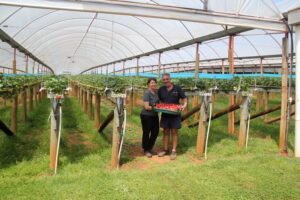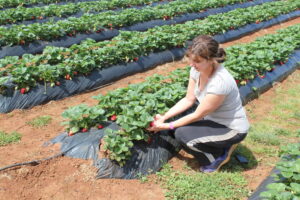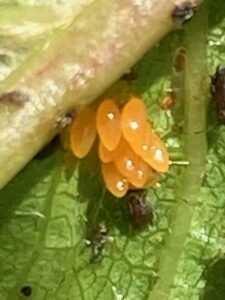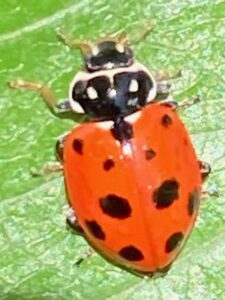Thanks to the people who have contributed to this week’s newsletter: Angelo Eliades, Chris Chapple, Delldint Fleming, Doris Glier, Jaimie Sweetman and Susan Palmer.
Chinese lantern (Abutilon spp.) by Jaimie Sweetman
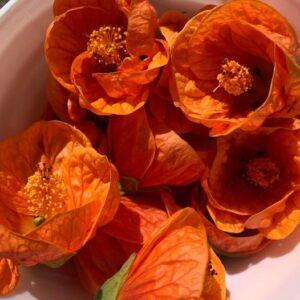 [Jaimie is part of the Edible Forest located on the Yarra Valley Estate in Dixons Creek. There are regular tours of the Edible Forest – read more and book your place on a future tour.]
[Jaimie is part of the Edible Forest located on the Yarra Valley Estate in Dixons Creek. There are regular tours of the Edible Forest – read more and book your place on a future tour.]
There are lots of species and variants of Chinese lanterns (Abutilon) spp.) and all have edible flowers. Just remove the green calyx and put the rest of the flower in your mouth. Or put the petals on anything from sweet to savoury. They actually taste a bit like lettuce only better and with a bit more sweetness.
The taste varies a bit from species to species and the best tasting ones are probably the orange hybrids (Abutilon x hybridum), as shown in the photo. Others range from yellow to red.
As well as chinese lanterns, plants in the Abutilon genus are sometimes called lantern-flowers, indian mallows or velvetleaves.
The plants flower for much of the year, starting in Autumn. They therefore provide edible flowers when not much else is flowering. This is great if you want to show off to your guests!
The plants grow to around 2 metres high. They are hardy and cope with little water and in most Melbourne conditions, although they will look better and flower more with some compost and mulch.
Read about more of Jaimie’s unusual edible plants on our website.
Spirli Strawberries – thank you for 10 years of strawberries (by Chris Chapple)
Strawberry season is a highlight of the Eltham Farmers’ Market year. The local season starts in mid or late October and runs until the end May or early June.
Spirli Strawberries has been Eltham Farmers’ Market’s strawberry supplier since 2014, making it a decade of service the market’s strawberry lovers!
They are based in Wandin in the Yarra Valley and the Spirli family have farmed there since 1973. Dominic (Dom) Spirli grew up with farming in his veins and he and wife Angela acquired their 3-acre farm in 1994. Initially, they grew vegetables but moved to strawberries in 2006 and, in 2017, made the important addition of hydroponics.
Angela (Ange) is also the Spirli ‘face’ at the market, sometimes assisted by her sister Teresa. Son Sam is also involved in the business from a distance; having chosen a career as an agronomist, he gets to sleep in on Sundays and keeps his fingernails clean, but provides advice on matters like hydroponics.
The Spirlis currently have about 52,000 strawberry plants. The original farm of 3 acres is now all hydroponics and a second leased farm is used for in-ground cultivation.
They grow three main varieties of strawberries: Albion (which are particularly sweet), Monterey and Petaluma (both of which are hydroponic varieties). Tutored by Sam, Dom is regularly testing new varieties.
Spirli Strawberries is a member of Ausberry, which is a group of 7 local growers who jointly supply supermarkets.
Ange loves her time at the market and really appreciates her market ‘family’, both customers and fellow stallholders. If there is ever any criticism, it is that she doesn’t bring enough so, in 2024, she has invested in a bigger van.
Read more Eltham Farmers’ Market tales.
A suggestion when growing Brussels sprouts
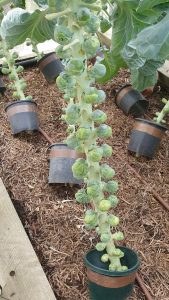 As briefly discussed last week, Brussels sprouts should be grown over summer and now, November, is the best time to plant the seedlings. In reaction, Susan Palmer has written in to say that, once the sprouts start forming (where the leaves meet the plant’s trunk), the plant should be extensively pruned so that it focuses more on growing the sprouts than on growing the leaves. More specifically, cut off all the leaves from the bottom half of the plant, in each case leaving around 2cm of stalk (which effectively provide a shelf for the sprouts to grow on). See the photo right. Watch this video.
As briefly discussed last week, Brussels sprouts should be grown over summer and now, November, is the best time to plant the seedlings. In reaction, Susan Palmer has written in to say that, once the sprouts start forming (where the leaves meet the plant’s trunk), the plant should be extensively pruned so that it focuses more on growing the sprouts than on growing the leaves. More specifically, cut off all the leaves from the bottom half of the plant, in each case leaving around 2cm of stalk (which effectively provide a shelf for the sprouts to grow on). See the photo right. Watch this video.
Also, snails quite like the seedlings so it is best to protect them in the early days, for example using copper tape as in the photo (the pots with the copper tape were properly planted in the soil when the Brussels sprouts were young and vulnerable). And, because they are brassicas, the cabbage white butterfly likes to lay its eggs on them so netting or similar is good.
Yes, you did know! (or, at least, Angelo knows)
Last week, Jen Chellew asked whether or not the worms in her compost are a different type of worm than the earthworms found elsewhere in her garden. Angelo Eliades has responded.
“Jen is correct: earthworms in compost bins are typically common garden earthworms. These earthworms emerge before rain to avoid drowning in their burrows and often end up in compost bins or pots on hard surfaces. They lay eggs in soil, so adding garden soil to a compost pile can introduce them. They can survive in compost if it doesn’t become too hot.
“The confusion arises from people not understanding that the term ‘compost worms’ does not refer to the worms that appear in your compost actually Rather, ‘compost worms’ refers to specific species of worm (such as tiger worms – Eisenia foetida) that are used in vermicomposting systems such as worm farms. These worms are quite different from common earthworms and have different habitat preferences, diet and roles in soil ecology. Earthworms are soil-dwellers that burrow deeply into the soil, prefer cool, moist conditions, feed primarily on soil with organic matter mixed within it, and play a vital role in soil aeration, nutrient cycling and improving soil structure. Compost worms live in environments rich in decaying organic matter and are found in the upper layers of compost, manure and leaf litter, thriving in environments with high microbial activity, where temperatures are warmer and food is plentiful. Compost worms do not burrow deeply and do not survive for long in mineral soil. They feed on a variety of decomposing plant materials, and don’t aerate the soil like earthworms do.”
Thanks, Angelo!
The results from the 2024 Eltham Wine Show
At the last minute, last Sunday’s show was cancelled because the required tasting licence hadn’t been issued. Obviously that is very disappointing and I apologise to everyone who tried to go based on my recommendation.
Anyhow, the judging still took place and you can find the results on Eltham and District Winemakers Guild website. There were around 500 entries, of which around half were awarded medals (gold, silver or bronze).
As you know from last week’s newsletter, my wife and I entered our metheglin in the mead section. We were awarded a silver medal and the judges’ comment was: “Floral honey and lifted spice on the nose. This is complemented by a well balanced sweetness on the palate. It runs the danger of being too sweet, but is saved by acid and flavour. It finishes a little short for the intensity of flavour.” There were a total of 12 mead entries, none of which were awarded gold and 3 of which were awarded silver.
In passing, the language of wine commentary is a world all of its own. I particularly liked this phrase about one of the red wine gold medal award winners: “… pencil shavings on the nose”. I immediately searched for a pencil, sharpened it, smelled the shavings and tried to imagine what the wine might have tasted like.
FareShare’s Christmas appeal
FareShare has launched its annual Christmas appeal. All donations over $2 are tax deductible.
As well as one-time donations, they are seeking regular donations. As they say, ““regular donations make the biggest difference and help FareShare plan our meal support to frontline charities.”
The 2025 National Sustainability Festival
The 2025 National Sustainability Festival will take place during February and applications are now open.
Some articles you might like to read
Delldint Fleming suggests that you might be interested in this two part article entitled The coming hunger (part 1 and part 2) by someone called Sharon Astyk. They are about the possible implications of climate change on food production.
Another new repair cafe
Kilsyth. At Japara Neighbourhood House, 54-58 Durham Road, Kilsyth. On the 3rd or 4th Saturday of each month (during school terms only), 2.30-4.30pm (look at their Facebook for precise dates).
That makes a total of 13 local, repair cafes on our website map.
The Melbourne ‘Local Food Connections’ community radio show
On next Sunday’s show (24th November, 10-10.30am) on 3CR (855 AM), Amy and Ann will interview the Black Peoples’ Union about their community kitchen. Listen by tuning into either the station (855 AM) or its livestream.
Podcasts of all previous episodes are available on their website, the latest being Nick Rose on Urban Agriculture Month (10th November).
Critter of the week – convergent lady beetle
All the photos are from Doris Glier’s garden and are of a convergent lady beetle (Hippodamia convergens in family Coccinellidae). The left hand photo is of some eggs, the middle photo is of a larva and the right hand photo is of an adult.
Doris says: “The larva might be freshly hatched as the head and legs are still almost transparent.”
The adult has two white lines that meet or converge behind the head, hence the common name. It has 13 or fewer spots on the bright reddish-orange or red forewings.
As with most other ladybirds, both adults and larvae are predators, feeding on aphids and the like.
Although native to North America, it can also be found in Australia (obviously!) and parts of Europe.
Which link was clicked most times in the last newsletter?
The most popular link in the last newsletter was my article on how to make mead.
The most popular event link in the last newsletter was the upcoming tour of the Bundoora Urban Agriculture Centre and Community Hub on 23rd November.
Word of the month – Bonne bouche
‘Bonne bouche’, meaning a tasty morsel, often something sweet eaten at the end of a meal.
Read about previous words of the month.
Proverb (or phrase) of the month
One for the road. Meaning: a final drink taken just before leaving on a journey.. Despite fashionable Internet folklore about prisoners in the Middle Ages having a final drink on their way to the gallows, this phrase actually only dates back to the 1930s when it was said in the UK Parliament. At that time, most people leaving pubs would have been travelling by foot so having an extra alcoholic drink was ok.
‘One for the road’ is also the title of multiple stories (including by Stephen King), plays (including by Harold Pinter), albums (including by the Kinks), songs (including by Arctic Monkeys), films (including by Hywel Bennett) and television episodes (including by Alfred Hitchcock).
Read about more food-related proverbs.
Gardening quote of the month
“If a tree dies, plant another in its place.” by Carolus Linnaeus.
Regular activities over the coming week
Farmers’ and other food markets
- Friday: Farm Raiser farm shop (Bellfield) and Community Grocer, Carlton.
- Saturday: Carlton, CERES farm gate (Coburg), Coburg and Farm Raiser farm shop (Bellfield).
- Sunday: Alphington and Eltham.
- Tuesday: Community Grocer, Fitzroy.
- Next Wednesday: Caring Farms Coop farm gate (St Helena) and Really Really Free Market (Coburg).
Food swaps
- Saturday: Blackburn North, Brunswick East, Heidelberg, Hurstbridge and Preston/Thornbury.
- Sunday: Eltham.
Community gardens
- Thursday: Buna (Heidelberg West), Diamond Valley Library (Greensborough), Edible Hub (Hurstbridge), Fawkner (playgroup – need to book), SEEDs (Brunswick) and Whittlesea.
- Friday: Panton Hill and West Brunswick.
- Saturday: FareShare kitchen garden open day (Abbotsford), Glen Park Oaks (Bayswater North), Links (Lalor), Macleod, Radicle Roots (Coburg) and Thrive (Diamond Creek).
- Sunday: Fawkner Food Bowls, Merri Corner (Brunswick East), North Carlton Railway Neighbourhood House garden tour, Regent (Reservoir) and West Brunswick.
- Monday: SEEDs (Brunswick) and Whittlesea.
- Tuesday: Bedford Park (Ringwood), Doncaster Hill and Watsonia.
- Next Wednesday: Eltham Neighbourhood House, Macleod, Newton Street (Reservoir), Sylvester Hive (Preston) and Span (Thornbury).
Not food-related but interesting
Enviro Fest 2024; Saturday, 30th November, midday-4pm; free; Doreen.
There will be hands-on craft with Eco Explorers, a live butterfly display and a wildlife show by Animals of Oz. There will also be a range of stalls about different aspects of the environment. In addition, they will be hosting the Circular Fashion Market next door, with around 40 stalls offering a wide range of pre-loved fashion items.
Upcoming face-to-face events – not cooking
Panel discussion – local food systems and the people who create them; Thursday, 28th November, 5-9pm; $27 ($7 per hour); Abbotsford.
Listen to the thoughts of industry experts as they discuss connecting with where our food comes from, to learn more about the pleasures, anecdotes and challenges facing them as they strive to provide products for consumers in an ethical and conscious manner. Panelists: Rachel Rubenstein (from CERES) and Thuch Ajak (from United African Farm). Moderator: Chris Williams (from the University of Melbourne).
Gift in a jar with Marie Vassallo; Wednesday, 4th December, 7-8.30pm; free; Whittlesea.
Marie Vassallo, from Rie’s Kitchen, will show you how to make a special Christmas treat/gift in a jar. Take a suitable size jar to create your gift.
In November
- Bundoora Urban Agriculture Centre and Community Hub pre-launch site tour; Wednesday, 20th November, 3-4pm; free; Bundoora.
- Low-waste celebrations with The Urban Nanna; Thursday, 21st November, 6.30-8pm; free; Preston.
- What is the future of urban agriculture in Naarm?; Thursday, 21st November, 6.30-8pm; free; Fitzroy North.
- Bundoora Urban Agriculture Centre and Community Hub pre-launch site tour; Saturday, 23rd November, 10-11am; free; Bundoora.
- Good & bad bugs, pests, snails & slugs and how to control them; Saturday, 23rd November, 10-midday; free; Bellfield.
- Beeswax wraps; Saturday, 23rd November, 10am-midday; $80 ($40 per hour); CERES.
- FareShare kitchen garden open day; Saturday, 23rd November, 10am-3pm; small donation requested; Abbotsford.
- Small space gardening; Saturday, 23rd November, 10am-3pm; $115 ($23 per hour); CERES.
- Organic pest and disease management; Saturday, 23rd November, 1-2pm; free; Fitzroy North.
- Beginners backyard beekeeping; Sunday, 24th November, 10am-3pm; $220 ($44 per hour); CERES.
- In-depth mushroom cultivation workshop; Sunday, 24th November, 10am-4pm; $161 ($27 per hour); Alphington.
- Summer planting masterclass; Sunday, 24th November, 11.30am-12.30pm; free; Brunswick.
- Pot and plant your own seedling; Sunday, 24th November, 1-2pm; free; Brunswick.
- Fitzroy urban agriculture walk; Wednesday, 27th November, 2.15-3.30pm; free; Fitzroy.
- Dalmore Whisky masterclass; Wednesday, 27th November, 6-10pm; $60 ($15 per hour); Croydon.
- Panel discussion – local food systems and the people who create them; Thursday, 28th November, 5-9pm; $27 ($7 per hour); Abbotsford.
- Create your own beeswax wraps; Thursday, 28th November, 6.30-7.30pm; free; Eltham.
- Italian cheese and wine masterclass; Saturday, 30th November, 2-5pm; $135 ($45 per hour); Thomastown.
In December
- Plants and permaculture; Sunday, 1st December, 10am-3pm; $145 ($29 per hour); CERES.
- Gift in a jar with Marie Vassallo; Wednesday, 4th December, 7-8.30pm; free; Whittlesea.
- Getting ready for the summer harvest (part 2); Wednesday, 4th December, 7-9pm; free; Doncaster.
Regular events
- Beekeeping (Bee Sustainable); roughly once a month on Saturdays, 1-4pm; $95 ($32 per hour); Brunswick East.
- Best of Little Italy dinner tour (Flavourhood Tours); Fridays, 5-7pm; $139 ($70 per hour); Carlton.
- Brewing coffee, various (Padre Coffee); Saturdays, 12.30-1pm (free) and Sundays, 1-4pm ($150); Brunswick East.
- Chocolate factory tour (Ratio Cocoa Roasters); Various Fridays and Saturdays; $20 ($20 per hour); Brunswick.
- Cocktail making (Brogan’s Way Distillery); various dates, times and costs; Richmond.
- Eltham walking food tour; various Saturday mornings and Thursday evenings; $65 ($22 per hour); Eltham.
- Melbourne’s ‘insiders’ brunch tour (Flavourhood Tours); various Saturdays, 10am-midday; $69 ($35 per hour); Coburg.
- Food forest tour (Edible Forest); Fridays and Saturdays, 11am-1pm and 1-3pm; $28 ($14 per hour); Dixons Creek.
- Gin making (Puss and Mew); Saturdays and Sundays; $175 ($58 per hour); Nunawading.
- Gin making or tasting (Naught Distilling); Saturdays, various times and prices; Eltham.
- Plant to harvest (Sustainable Macleod); 1st Saturday of the month, midday-1pm; $5; Macleod.
- Wine tasting (FoodSocial); various Thursdays, 6-7.30pm; $33 ($22 per hour); Carlton.
- Wine tasting (Northside Wines); various days, times and prices; Northcote.
Upcoming face-to-face events – cooking
Cooking demo and community lunch; Friday, 22nd November, 11am-12.30pm; free; Fawkner.
Learn how to cook a delicious meal with minimal waste. Following the demonstration, you will be invited to a community lunch.
Cupcake decorating workshop on Monday, 25th November, at 11.15-11.45am and again at 3.30-4pm; $5; Ivanhoe.
Each child will design and decorate their own cupcake to take home. They will get hands-on with icing, sprinkles and fun toppings to turn plain cupcakes into their own sweet masterpieces. Organised by Livingstone Community Centre.
Gingerbread house decoration on Sunday, 8th December, at 10.30-11.30am and again at 1-2pm; $46 ($46 per hour); Camberwell.
This workshop is for children aged 7+. Create your own Christmas scene by decorating a gingerbread house. Use icing to attach a variety of sweets, lollies and sprinkles.
Make your own brownie and granola gift jar; Wednesday, 11th December, 4.30-5.30pm; $22 ($22 per hour); Kilsyth.
Make a brownie and granola gift jar. Brownie and granola gift jars are a way to share your love of baking (or snack-making) with friends and family. Plus the jars can be easily customised with different mix-ins or flavours to suit anyone’s taste. Organised by Japara Living & Learning Centre.
In November
- Indian cooking – Punjabi (2 sessions); on Wednesdays, 20th and 27th November, both 6.30-8.30pm; $118 ($30 per hour); Hurstbridge.
- Kombucha and jun, M.O.B.; Thursday, 21st November, 6.30-8.30pm; $40 ($20 per hour); Fitzroy North.
- Cooking demo and community lunch; Friday, 22nd November, 11am-12.30pm; free; Fawkner.
- Sourdough bread workshop; Saturday, 23rd November, 10am-1pm; $55 ($18 per hour); Panton Hill.
- Fermenting at home; Sunday, 24th November, 10am-1pm; $120 ($40 per hour); CERES.
- Plant-based cooking; Sunday, 24th November, 11am-1pm; $25 ($13 per hour); Forest Hill.
- Pizza dough cooking demonstration; Sunday, 24th November, 11.05am-12.05pm; free; Brunswick.
- Sake x fermented food pairing; Sunday, 24th November, midday-1.30pm; $107 ($71 per hour); Fitzroy North.
- Pandan crepe cooking demonstration; Sunday, 24th November, 12.30-1.30pm; free; Brunswick.
- Sake x fermented food pairing; Sunday, 24th November, 2-3.30pm; $107 ($71 per hour); Fitzroy North.
- Cupcake decorating workshop; Monday, 25th November, 11.15-11.45am; $5; Ivanhoe.
- Cupcake decorating workshop; Monday, 25th November, 3.30-4pm; $5; Ivanhoe.
- Shannon Martinez – plant-based chef unveils vegan Italian food; Tuesday, 26th November, 6.30-8pm; free; Fitzroy North.
- St John’s Christmas gingerbread house making event; Friday, 29th November, 7-9pm; $45 ($23 per hour); Diamond Creek.
- Handmade gnocchi masterclass and lunch; Saturday, 30th November, 11am-2pm; $153 ($51 per hour); Brunswick.
- Mexican cooking; Saturday, 30th November, 10am-3pm; $150 ($30 per hour); CERES.
- A flavourful night with Nana Africa and ReWine; Saturday, 30th November, 1-3pm; $65 ($33 per hour); Brunswick East.
- A flavourful night with Nana Africa and ReWine; Saturday, 30th November, 4-6pm; $65 ($33 per hour); Brunswick East.
In December
- Sourdough bread baking; Sunday, 1st December, 9am-5pm; $220 ($28 per hour); CERES.
- Festive cooking with Natalie; Thursday, 5th December, 6-8pm; $48 ($24 per hour); Forest Hill.
- Mini master cooks (9-12 years) – Christmas cookies; Saturday, 7th December, 10.30am-12.30pm; $55 ($28 per hour); Forest Hill.
- Cupcake decorating workshop; Saturday, 7th December, 5-7pm; $75 ($38 per hour); Ivanhoe.
- Vegan desserts; Sunday, 8th December, 10am-3pm; $150 ($30 per hour); CERES.
- Gingerbread house decoration; Sunday, 8th December, 10.30-11.30am; $46 ($46 per hour); Camberwell.
- Gingerbread house decoration; Sunday, 8th December, 1-2pm; $46 ($46 per hour); Camberwell.
- Italian Xmas treats (2 sessions); on Tuesday, 10th December and Wednesday, 11th December, both 6-8pm; $79 ($20 per hour); Fawkner.
- Make your own brownie and granola gift jar; Wednesday, 11th December, 4.30-5.30pm; $22 ($22 per hour); Kilsyth.
- Christmas cookie swap; Saturday, 14th December, 10am-midday; $55 ($28 per hour); Richmond.
- Christmas cupcakes; Saturday, 14th December, 1-4pm; $60 ($20 per hour); Ringwood North.
- Gingerbread cookie house workshop; Sunday, 15th December, 1-2.30pm; $65 ($44 per hour); Forest Hill.
- Gingerbread house workshop with sparkling wine; Thursday, 19th December, 7-8.30pm; $60 ($40 per hour); Wandin North.
- Gingerbread house workshop with sparkling wine; Friday, 20th December, 7-8.30pm; $60 ($40 per hour); Wandin North.
- Christmas gingerbread house family workshop; Saturday, 21st December, 10.30am-midday; $50 ($33 per hour); Wandin North.
Regular classes
- Many different classes (Brunswick Kitchen); various dates, times and prices; Brunswick.
- Many different classes (Cozymeal); various dates, times and prices; Carlton.
- Many different classes (Eat cook learn love food); various dates, times and prices; Carlton.
- Many different classes (Free to Feed); most days, various times; mostly 3 hours long and $155 ($52 per hour); Northcote.
- Many different classes (Otao Kitchen); various dates, times and prices but mostly 3 hours long and $197 ($66 per hour); Abbotsford.
- BBQ classes (BBQ Cooking School); various dates and times; $135-150 ($45-50 per hour); Brunswick.
- Biscuit making (Sissys); various Tuesdays, 10am-3pm; $162 ($32 per hour); Blackburn.
- Bread making (Convent Bakery); various Sundays, 8am-2pm; $230 ($38 per hour); Abbotsford.
- Cake decorating (Miss Biscuit); various dates, times and prices; Camberwell.
- Cake decorating (Sweetly Styled); various dates and times; $200 ($100 per hour); Carlton.
- Chocolate making (Sissys); various Thursdays, Fridays and Saturdays; $152 ($38 per hour); Blackburn.
- Chocolate making and pastry classes for children (Yarra Valley Chocolaterie); various dates, times and costs; Yarra Glen.
- Crepes (Little Yarra Creperie); Wednesdays 10am-1pm and Saturdays, 3-6pm; $120 ($40 per hour); Thornbury.
- Italian (Al Dente Cooking); Fridays and Saturdays, 9am-1pm; $155 ($39 per hour); Chirnside Park.
- Italian (Pietro Gallus); various dates, times and prices; Warrandyte South.
- Italian (Rosa’s); various Saturdays and Sundays, 10.15am-3pm; mostly $165 ($35 per hour); Bundoora.
- Italian (Small Axe); various dates, times and prices; Brunswick.
- Japanese (Paul Le Noury); various dates and times; $200 ($50 per hour); Carlton.
- Kombucha (Good Brew); last Thursday of each month, 7-8.30pm; $54 ($36 per hour); Brunswick.
- Let’s get cooking (Greenbrook Community House); every Monday during term times, midday-2pm; $10; Epping.
- Pickle party (Greenhills Neighbourhood House); Fridays during school terms, 9-11am; free; Greensborough.
- Sourdough bread making (Bee Sustainable); roughly once a month on Saturdays, 9-11.30am; $185 ($74 per hour); Brunswick East.
- Sourdough bread making (The Fermented Mumma); various dates, 6.30-8.30pm; $120 ($60 per hour); Collingwood.
- South American (Margot & Montanez); various dates and times; Abbotsford.
- Spanish (Natalia Martinez); various dates and times; $130 ($65 per hour); Carlton.
- Spanish (Paul Le Noury); various Fridays and Sundays; $180 ($45 per hour); Carlton.
- Taiwanese (Christina Chang); various dates, times and prices; Brunswick.
- Tea blending (Impala + Peacock); various Sundays; $75-89 ($60 per hour); Brunswick.
- Truffle making (Ratio Cocoa Roasters); various Sundays, 11am-1pm; $75 ($38 per hour); Brunswick.
- Truffle and praline making (Sissys); various Wednesdays, 6-10pm; $183 ($46 per hour); Blackburn.
- Nonna & Mum’s cooking class; 4th Thursday of each month, 7.30-10pm; $20 ($8 per hour); Thornbury.

